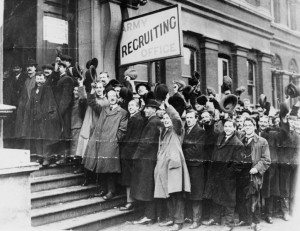World War One: Misinformation and miscommunication
 In 1914 there were no mobile telephones, televisions or ipods. There were no computers and so no twitter or You Tube. Cinema and radio were still a novelty. People received their news via the tabloid papers, telegrams or witten letters. And none of these methods was entirely reliable.
In 1914 there were no mobile telephones, televisions or ipods. There were no computers and so no twitter or You Tube. Cinema and radio were still a novelty. People received their news via the tabloid papers, telegrams or witten letters. And none of these methods was entirely reliable.
Communications between individuals and governments tended to be slow and were often delayed, so that events on the ground moved faster than the reception of letters or telegrams – a crucial factor in the confusion between the Kaiser and Nicholas II immediately preceding hostilities.
Secondly, communication between capital cities and the rest of the country were delayed. This mattered, because most people lived in the countryside or small towns far from their capital. Russia, to use the most extreme example, boasted Moscow and St. Petersburg, but the rest of the country was a vast space of ignorance and superstition. In this situation, rumour thrived and uncertainty and apprehension flourished. To get up-to-date news, people tended to gather in public places where newspapers were for sale, or to listen to official spokesmen addressing the crowd.
Most newspaper photographs of the period showing who gathered in Piccadilly and Trafalgar square on 31 July and 1 August 1914 picture well-dressed, middle class men. Sporting bowler hats, they look relaxed, even smiling. Relief is apparent on many faces, that at last the waiting and the tension is over – something had been settled.
In similar vein, across Europe, people and rulers were as one. In St. Petersburg, the crowd knelt respectively before the Tsar and his family; a mere two weeks previously these same crowds had jeered and reviled them. At last the Tsar of all the Russia’s, the “little father” of the Russian peasant ( as Nicholas liked to call himself ) was convinced he had found the key to the affections of his people. Meanwhile in Germany, seeing the crowds at the Brandenburg Gate, the Kaiser declared that he now felt he recognised no social class, only Germans. The Chief Rabbi of Berlin felt moved to offer prayers for the Kaiser’s well-being. Church leaders were quick to assure their flocks that this would be a “Just War”. The virtues of courage and self-sacrifice in the face of an uncivilised enemy would bring victory – a sentiment repeated ad neausea through the war.
Both the clergy and moral commentators enthusiastically endorsed the view that the coming conflict would prove a sort of catharsis, a cleansing of the decadence associated with the long years of peace. These sentiments come at the end of the “Belle Epoch” in France, and in England a period of public school values associated with ideas of robust Christianity permeating middle-class education. In Russia and the Hapsburg Empire, junior officers stationed in isolated garrison towns fought boredom by excessive drinking and womanising. It was thought a quick war would be morally cleansing.
Once war was declared and the troops mobilised, the composition of the street crowds changed: there were more young women and mothers carrying small bundles of provisions, linking arms with soldiers, blowing farewell kisses and throwing flowers.
This rather nervous euphoria did not last long in any country. By Christmas the tabloids were reporting mass slaughter; casualty lists highlighted by black borders were posted at mainline railway stations and news kiosks all over Europe. Now the dress shops of Oxford Street advertised khaki dresses, not their normal Christmas glitter. The World had grown dark.
